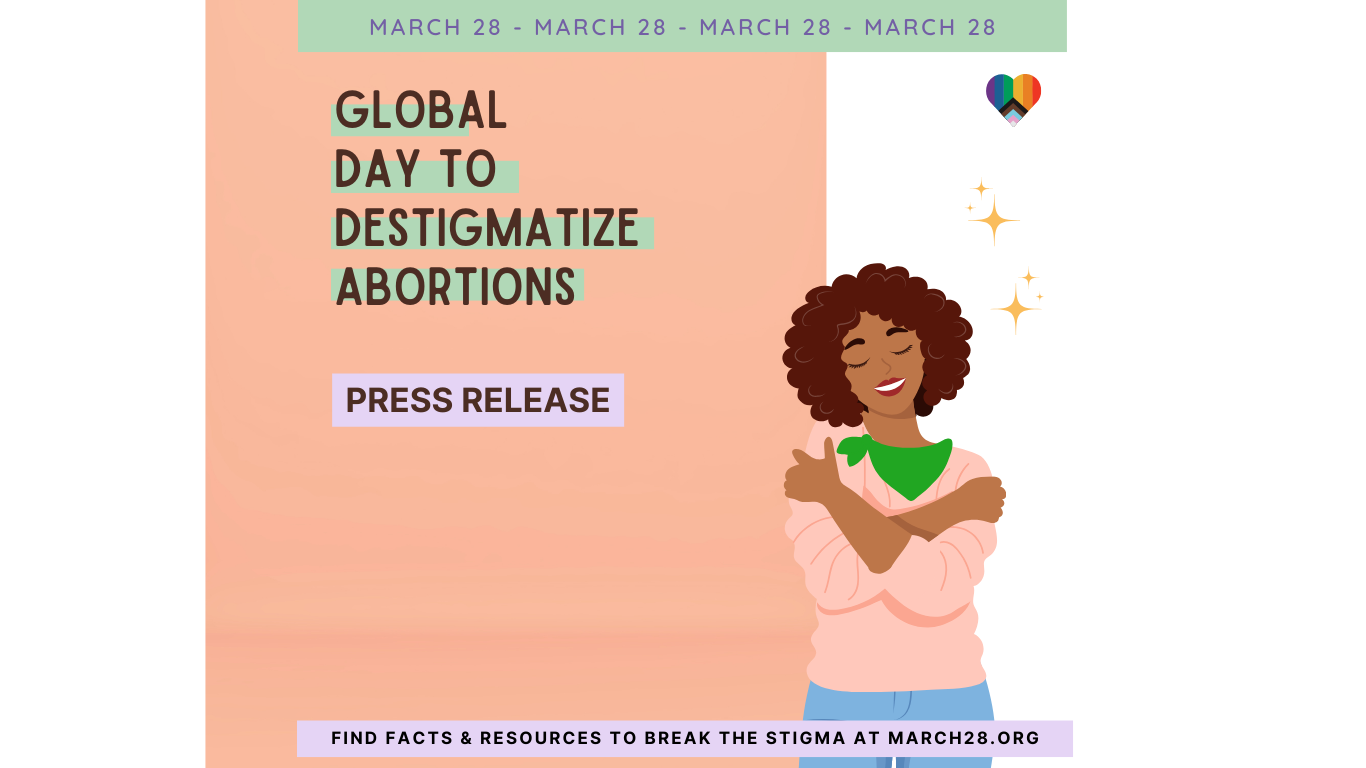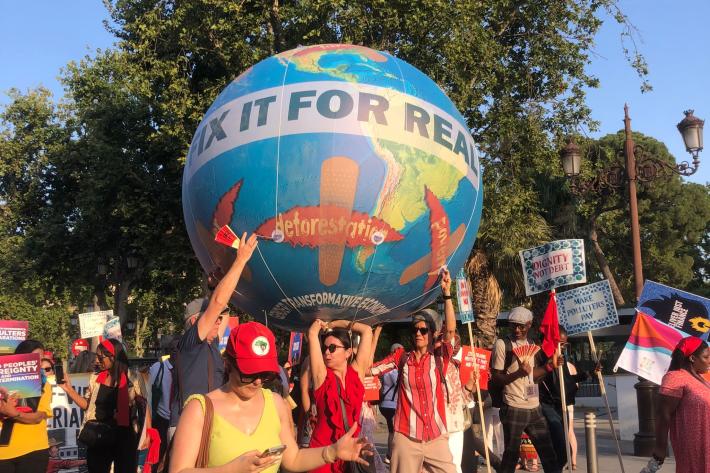Latest press releases
A selection of stories from across the Federation

Nearly 9 Million Denied Essential Reproductive Healthcare as Trump-Era Funding Cuts Force Global Clinic Closures, IPPF Reports
FOR IMMEDIATE RELEASE
For media enquiries
Telephone:
+44 7918 845944Email IPPF:
Email: media@ippf.org

| 14 March 2025
Abortion is Healthcare. Stigma is the Crisis: Global Day of Action to Destigmatize Abortion – March 28
28 March 2025 - Today, reproductive justice activists worldwide are mobilising for the Global Day of Action to Destigmatize Abortion. Over 180 feminist organisations and collectives are uniting to challenge harmful narratives, dismantle barriers, and demand safe, stigma-free abortion access everywhere. Abortion stigma, fuelled by patriarchy, misinformation, and control, continues to block access, criminalise care, and force people into unsafe conditions. This global campaign demands an end to abortion bans, medical gatekeeping, and the cultural shame that silences those who seek care. “Deciding whether to continue a pregnancy is our right. The only people who should feel shame are those forcing us into unsafe conditions.” – Mariana Gonzalez, the International Network for the Reduction of Abortion Discrimination and Stigma (Inroads). Abortion bans don’t just control bodies—they reinforce systemic racism and classism. Wealthy people will always find ways to access safe abortion care, while those from marginalised communities—especially Black, Indigenous, and low-income people—face the harshest consequences. These bans are rooted in a long history of reproductive oppression, targeting those already denied healthcare, economic stability, and bodily autonomy. Restricting abortion access isn’t about "protecting life", it’s about controlling who gets to make decisions about their future. As anti-abortion movements gain momentum worldwide, this day of action is a rallying cry for bodily autonomy and real access to abortion care. “Our fight has never been just about abortion—it’s about freedom. Who controls our bodies? We do. Anti-choice forces believe the state, the church, or the government should control us. But they will never stop us—and they will never stop abortion.” – Mara Clarke, Supporting Abortions for Everyone (S.A.F.E.) “We refuse to be dictated to by anti-rights groups and governments that have seized power. We will continue to fight for sexual and reproductive health and rights for all—especially those who have been excluded and criminalised.” – Melissa Cockroft, Global Lead - Abortion, IPPF Globally, 1 in 3 women will have an abortion in their lifetime. Every year, 73 million abortions take place, accounting for 61% of all unintended pregnancies. Bans don’t stop abortions from happening, they just make it more dangerous. Giving birth is 14 times riskier than having an abortion, yet anti-choice bans claim to care about safety while forcing many into unwanted pregnancies with far greater health risks. “Abortion bans don’t protect anyone. They isolate people, fuel criminalisation, and put lives at risk. Everyone deserves access to care without fear or shame.” – Debanjana Choudhuri, WGNRR The fight isn’t just about legality, it’s about access, dignity, and justice. While anti-abortion forces push for criminalisation, activists are building a global network of support that transcends borders, oppressive systems, and state control. “We are constructing a new model for reproductive justice—one that is rooted in community, care, and the belief that everyone has the right to decide what happens to their own body.” – Lucia Berro Pizzarossa, WHW & Vecinas Feministas Abortion is a human right, and we are claiming it. ENDS For media inquiries, contact: Mariana, Communications Manager, inroads – mariana@makeinroads.org Nerida Williams, Senior Media Advisor, IPPF – newilliams@ippf.org Notes: In over 50 countries, abortion is still criminalized, putting lives at risk. Even where it is legal, stigma-fueled barriers limit authentic access and force people to navigate unnecessary restrictions, shaming, and delays. Self-managed abortion is recognized by the World Health Organization (WHO) as safe and effective. Studies show that 99% of people who use abortion pills successfully end their pregnancies, with 96.4% not requiring any surgical support. (National Center for Biotechnology Information) Abortion is also essential for miscarriage care. The same medical procedures and medication used for abortion are critical for safely treating common miscarriages and preventing complications. Abortion bans put all pregnant people at great risk. (Mayo Clinic) To commemorate this day, multiple resources & events are being organized and shared on the march28.org website. Abortion advocates and allies are invited to join the events and raise awareness on March 28th.

| 29 November 2024
World: States must step up protection for abortion care providers
On International Women Human Rights Defenders Day, a coalition of human rights organizations are launching a new set of guidelines for governments to protect frontline abortion rights defenders, including healthcare providers. Amnesty International, the International Planned Parenthood Federation (IPPF), Ipas, MSI Reproductive Choices, the Organisation Pour Le Dialogue Pour L’Avortement Sécurisé (ODAS Centre) and the International Confederation of Midwives (ICM) published the Key principles and actions to safeguard abortion care providers as human rights defenders. The document provides a set of concrete recommendations for governments to guarantee that health professionals and other human rights defenders of the right to abortion care for women, girls and pregnant people, can do so without fear of attacks and intimidation. “Despite the global progress we have seen on sexual and reproductive health and rights over recent years, including steps to decriminalize abortion in many countries, defending abortion rights, which includes the provision of abortion by healthcare providers, remains a dangerous job,” said Fernanda Doz Costa, Gender, Racial Justice, Migrants & Refugees Programme Director at Amnesty International. “Abortion rights defenders are failed by many States. On the one hand, States are negligent in their obligation to protect them while, on the other hand, abortion continues to be restricted and criminalized. As such defenders are deemed less ‘deserving’ of support and protection and are actively targeted. The Key Principles show governments how to break this cycle,” said Melissa Cockroft, Global Lead on Abortion, IPPF. “Democracy, human rights, and abortion rights are under attack, and so too are the frontline defenders of these rights. They risk physical and verbal attacks, threats, smears and intimidation to ensure people have access to abortion – a critical and essential health care service. We stand with them today and every day in the fight for human rights, and call on the global community to do the same,” said Dr. Anu Kumar, President and CEO of Ipas. The Key Principles include practical recommendations to: Prevent violations by implementing specific protection protocols and establishing channels to report harassment and receive support; Enable defenders to exercise their rights without fear by ensuring universal access to comprehensive sexual and reproductive health, and decriminalizing abortion – as reinforced by the WHO’s Abortion guidelines; Safeguard defenders’ rights by protecting civic space and tackling abortion stigma; Provide redress, by stopping the criminalization of abortion defenders, and by bringing to justice those who attack them; “As the organized rollback of reproductive rights continues, the attacks being directed at healthcare providers are getting worse. It's time for States to uphold their duty and defend those who are risking everything to provide lifesaving care. We look forward to working alongside and together with governments, professional associations, donors, health facility managers, and civil society organisations to ensure frontline healthcare providers are given the support they deserve,” said Simon Cooke, MSI Reproductive Choices’ CEO. "Comprehensive abortion care is an essential health service. Midwives who provide these services are often subjected to discrimination, intimidation, and in some cases, even violence. In order to uphold women's right to safe abortion care, we need to protect and enable the midwives and health professionals who provide these services. To do this, professional associations, civil society, policy makers and governments need to implement the Key principles and actions to safeguard abortion care providers as human rights defenders," said Sandra Oyarzo Torres, ICM President. “We refuse to stay silent in the face of constant attempts to restrict and criminalize abortion and its defenders, and we commit to stand firmly with this fundamental human right,” said Kadidiatou SOW, Director of the ODAS Centre. An Amnesty International report in 2023 detailed the danger and difficulties faced by those who defend abortion rights and provide access to services, often in challenging circumstances, including midwives, doctors, nurses, doulas, activists and all those who help pregnant people manage their own abortions with medication. The report evidenced how many people working in healthcare settings are exposed to hostility and abuse from colleagues, employers, patients and others who oppose abortion. Those working outside health facilities are also exposed to physical and verbal attacks, threats, smears and intimidation. Some are criminalized through prosecutions, investigations and arrests. The report also documents cases of stigmatization, isolation and ostracization, and restrictions on rights to freedom of expression, association and assembly. Attacks are more common in countries where abortion is stigmatized, restricted or criminalised. “Abortion is essential healthcare. Yet, as healthcare providers we are routinely faced with discrimination and violence for simply doing our jobs. Restrictive abortion laws and attitudes cause harm. They create hostile environments that feed abortion-related stigma that smears healthcare providers and those that seek abortion care as criminals. We all know colleagues, unfortunately, who have battled with stigma, career blocking, intimidation, physical attack, imprisonment, and even in the most extreme cases health care providers have been murdered,” said Dr Anne-Beatrice Kihara, President of the International Federation of Gynecology and Obstetrics (FIGO). For more information or to organize an interview, please contact: press@amnesty.org or media@ippf.org
















